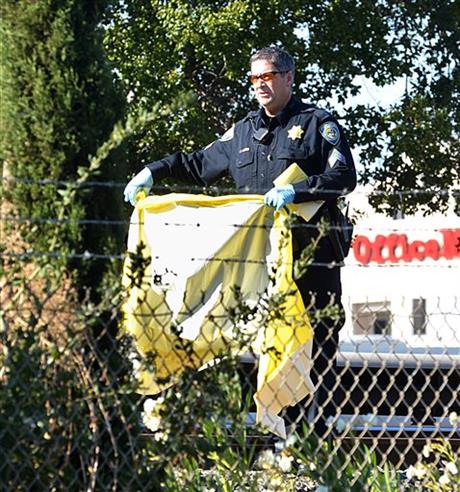
By TERRY COLLINS and TRACIE CONE
A BART police officer covers one of the two people that were struck and killed by a moving BART train along Jones Road in Walnut Creek, Calif., on Saturday, Oct. 19, 2013. (AP Photo/The Mercury News, Dan Rosenstrauch)
OAKLAND, Calif. (AP) — A San Francisco Bay Area commuter train returning from routine maintenance struck and killed two workers who were inspecting the tracks Saturday afternoon — an accident that comes amid a strike that has shut the Bay Area Rapid Transit system down to riders for the past few days.
The four-car train was being run in automatic mode under computer control at the time of the accident, BART’s Assistant General Manager Paul Oversier said at a news conference.
There were several people aboard the train, Oversier said, but he would not say who had been the operator. In an earlier statement, BART said only that the person was an experienced operator.
One system employee and one contractor were killed in the accident in the East Bay city of Walnut Creek shortly before 2 p.m. The train had been at a yard where workers had been cleaning off graffiti, BART officials said.
“This is a tragic day in BART’s history,” the system’s general manager, Grace Crunican, said. “The entire BART family is grieving.”
Officials from the unions representing BART’s train operators and some of the system’s other workers have warned of the danger that could come with allowing managers to operate trains as BART had planned to do in case of a strike. The unions have been on strike since Friday.
One of the unions on strike, Amalgamated Transit Union 1555, announced that its 900 workers would not be picketing on Sunday out of respect for the victims and their families.
Also Saturday, ATU local president Antonette Bryant said she was taking a final contract offer from BART before members for a vote, but expects it will be rejected.
“It’s our hope we can get it to members this week,” Bryant told The Associated Press in a telephone interview. She said she expects the vote to be “a resounding no.”
Bryant later issued a statement, saying Saturday’s accident was a “terrible human tragedy.”
The two workers killed were performing track inspections about a mile from the Walnut Creek station in an area some 25 miles northeast of San Francisco, BART said.
They were responding to a reported dip in the track and both had extensive experience.
“They understand the railroad, they understand how to work around moving trains,” Oversier said. “They were doing today what they have done 100 if not 1000 other times in their career.”
The procedures for such maintenance require one employee to inspect the track and the other to serve as a lookout for oncoming traffic, BART officials said. They did not immediately say whether that procedure had been followed.
Police placed yellow tarps over the two dead who were about 100 yards apart on the tracks.
The victim’s names and ages were not immediately released.
Oversier said that the BART worker who was killed is a member of the American Federation of State, County and Municipal Employees.
BART officials wouldn’t address questions on the union’s warnings about train safety during a walkout.
“The labor issues are not in the forefront of our mind,” Oversier said. “We’ve just lost two people in the BART family.”
The National Transportation Safety Board announced late Saturday that it has informed BART and the California Public Utilities Commission that the federal agency will take over the investigation.
The deaths were the first of a BART employee in five years.
In October 2008, about one stop down on the same line, 44-year-old BART employee James Strickland was hit from behind while inspecting the tracks. Trains in both directions were sharing the same stretch of track at the time because of maintenance and Strickland had apparently been unaware.
Before Saturday’s accident, union leaders spent much of the day attempting to convince the riders who make 400,000 daily trips on the system that workers’ demands are not unreasonable amid increasing hostility in social media and other outlets.
There was general agreement by both sides on on the economic parts of the contract, but union officials said they came to an impasse over work rules, including the length of the work day and when overtime pay kicks in.
BART spokesman Rick Rice said that the two sides remain in communication though they were not expected back at the bargaining table.
Messages left for negotiators from the Service Employees International Union, which also represents workers, were not immediately returned.
However, SEIU president Roxanne Sanchez said earlier Saturday they were willing to sign off on pay, health care and pension issues, and send the remaining snarl — work rules — to an arbitrator, a proposal BART has previously refused. But BART officials later said they would be willing to send the entire contract to arbitration but not the work rules alone.
Weekend BART use is light compared with the workweek, and frustrated commuters Friday said they hoped an agreement could be quickly reached.
The system carries its ridership through tunnels under the bay and into the region’s urban core of San Francisco from four surrounding counties, relieving what would otherwise be congested bridges.
In an effort to alleviate delays, many of the Bay Area’s other 27 transit systems added bus, ferry and rail service. Carpools and rideshare programs were also busy, and more cyclists took to the streets. Ferry operators said their ridership has doubled.
___
Associated Press writer Andrew Dalton contributed to this report from Los Angeles. Cone reported from Fresno.


